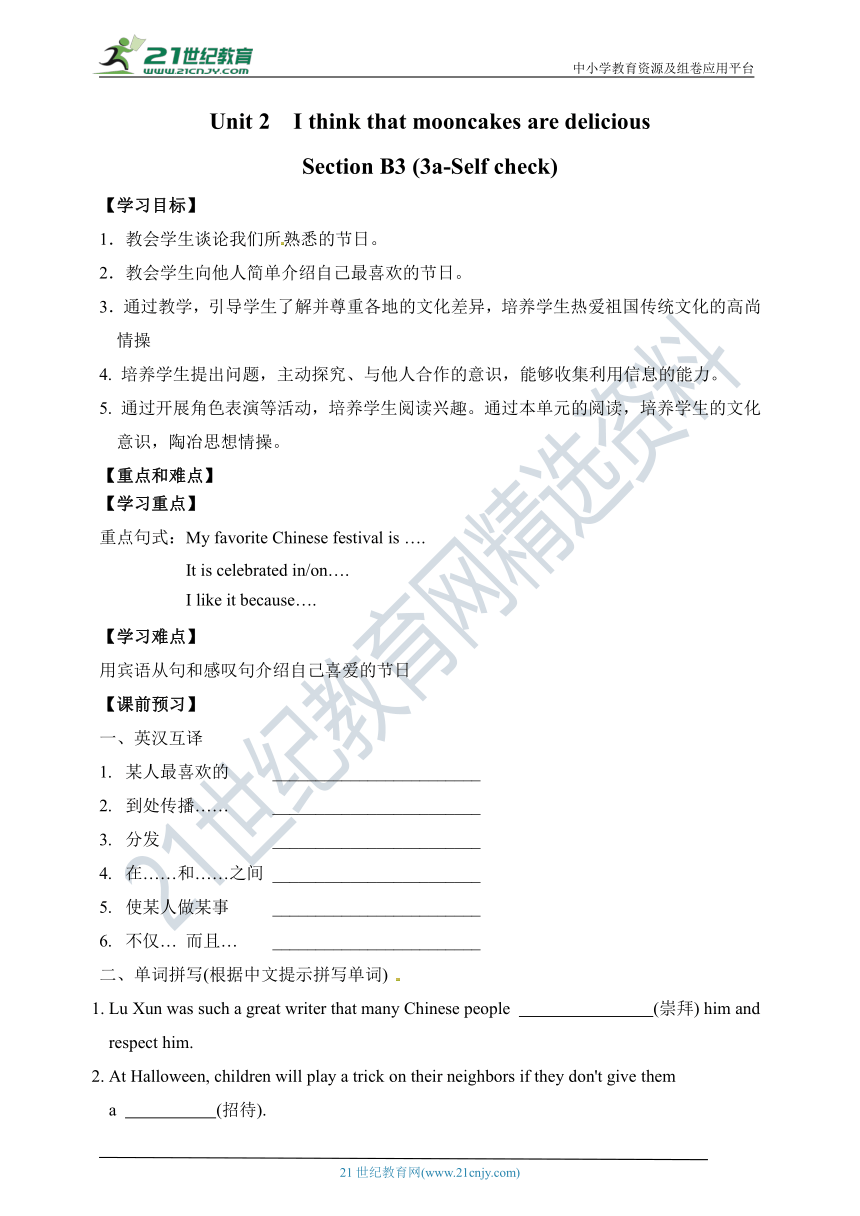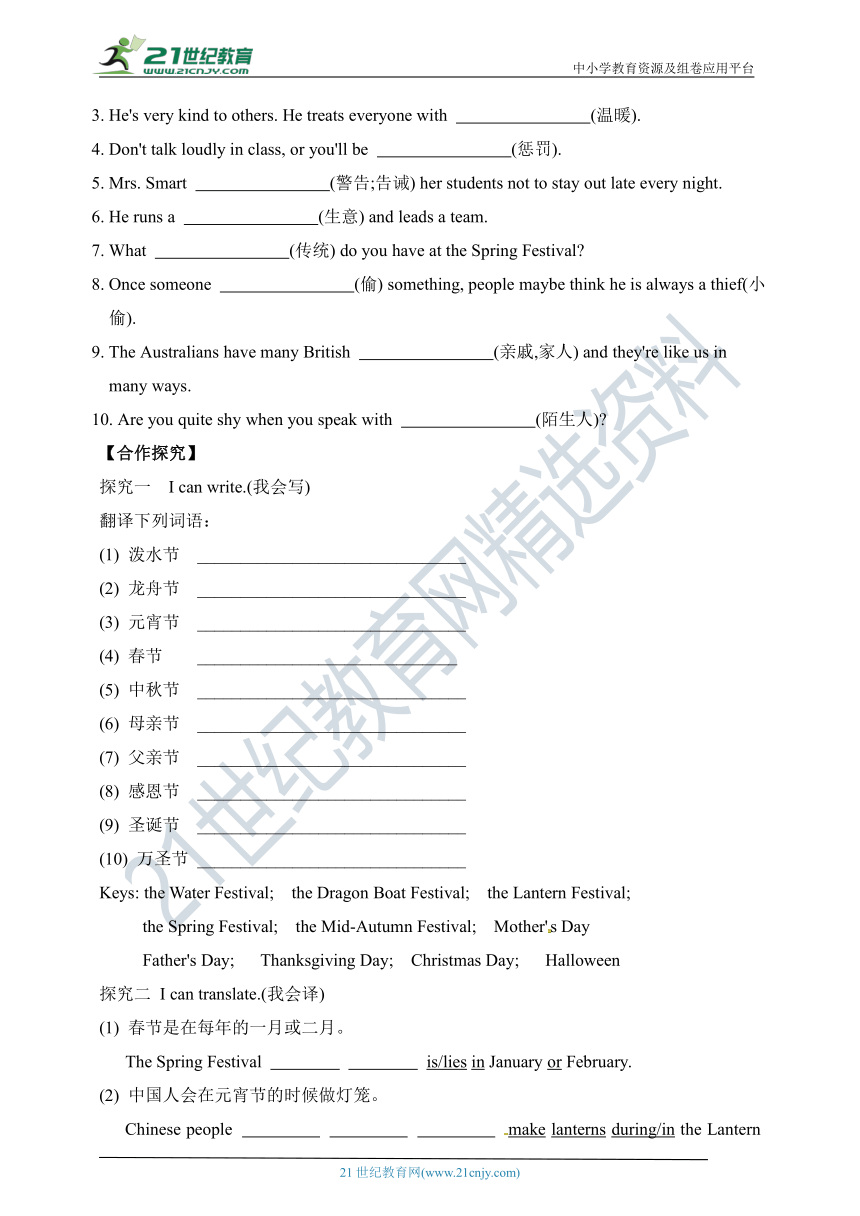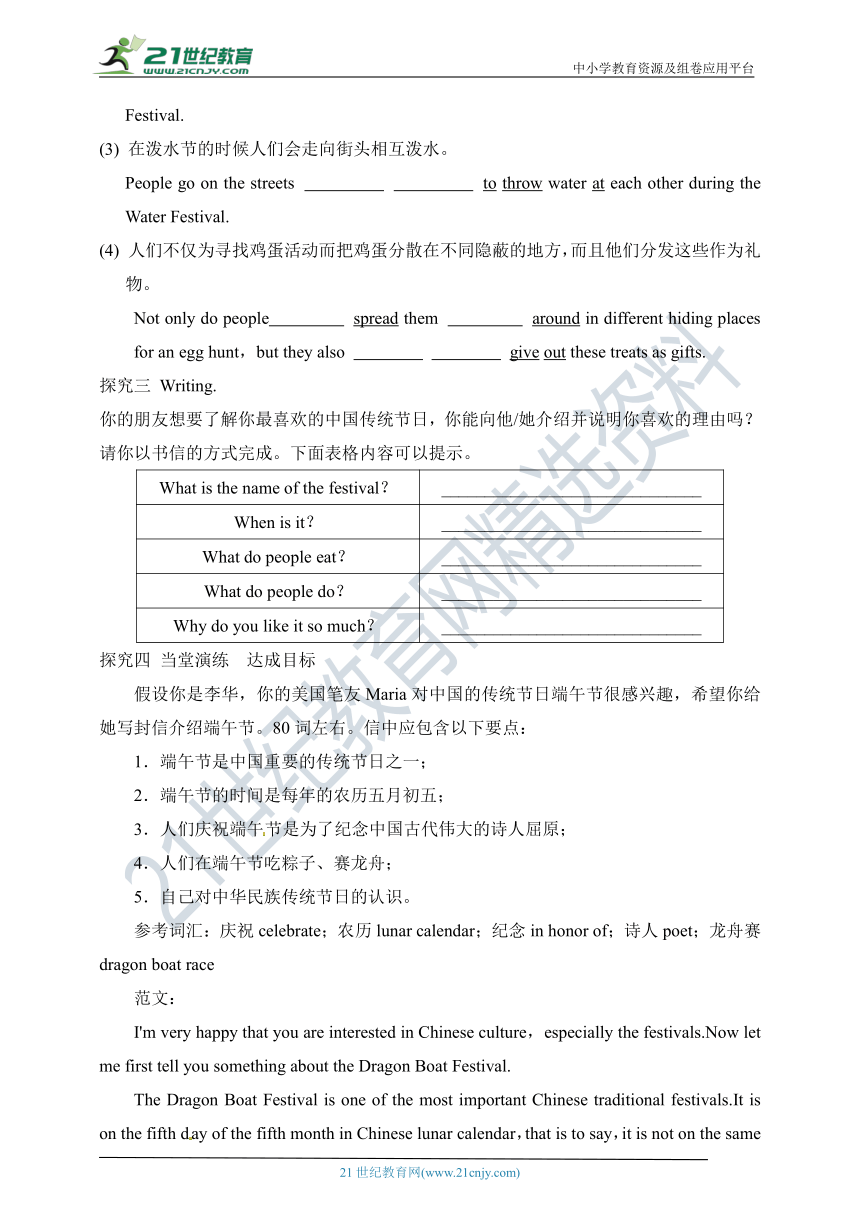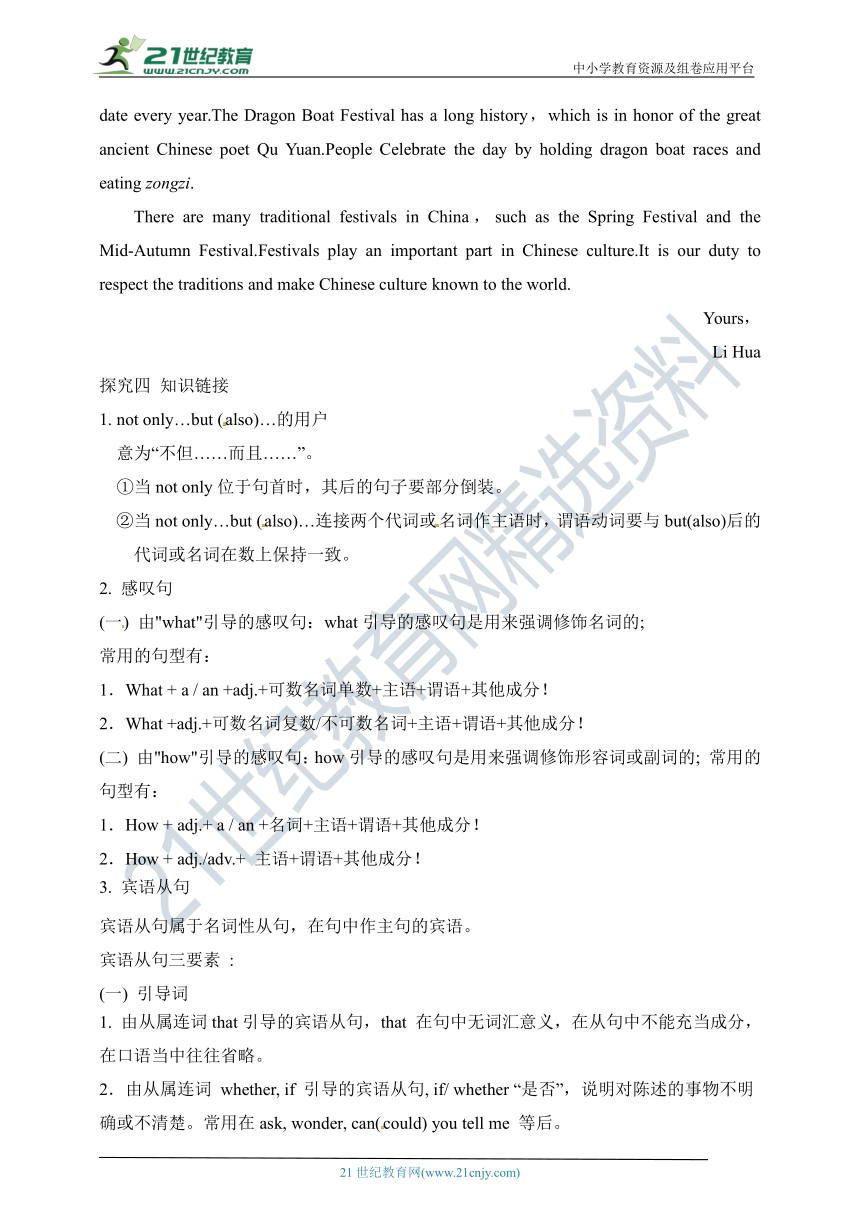Unit 2 I think that mooncakes are delicious Section B3 (3a-Self check) 优学案(含答案)
文档属性
| 名称 | Unit 2 I think that mooncakes are delicious Section B3 (3a-Self check) 优学案(含答案) |

|
|
| 格式 | zip | ||
| 文件大小 | 1.1MB | ||
| 资源类型 | 试卷 | ||
| 版本资源 | 人教新目标(Go for it)版 | ||
| 科目 | 英语 | ||
| 更新时间 | 2019-08-12 14:59:14 | ||
图片预览




文档简介
Unit 2 I think that mooncakes are delicious
Section B3 (3a-Self check)
【学习目标】
1.教会学生谈论我们所熟悉的节日。
2.教会学生向他人简单介绍自己最喜欢的节日。
3.通过教学,引导学生了解并尊重各地的文化差异,培养学生热爱祖国传统文化的高尚情操
4. 培养学生提出问题,主动探究、与他人合作的意识,能够收集利用信息的能力。
5. 通过开展角色表演等活动,培养学生阅读兴趣。通过本单元的阅读,培养学生的文化意识,陶冶思想情操。
【重点和难点】
【学习重点】
重点句式:My favorite Chinese festival is ….
It is celebrated in/on….
I like it because….
【学习难点】
用宾语从句和感叹句介绍自己喜爱的节日
【课前预习】
一、英汉互译
某人最喜欢的 ________________________
到处传播…… ________________________
分发 ________________________
在……和……之间 ________________________
使某人做某事 ________________________
不仅… 而且… ________________________
二、单词拼写(根据中文提示拼写单词)
1. Lu Xun was such a great writer that many Chinese people ?(崇拜) him and respect him.
2. At Halloween, children will play a trick on their neighbors if they don't give them a ?(招待).
3. He's very kind to others. He treats everyone with ?(温暖).
4. Don't talk loudly in class, or you'll be ?(惩罚).
5. Mrs. Smart ?(警告;告诫) her students not to stay out late every night.
6. He runs a ?(生意) and leads a team.
7. What ?(传统) do you have at the Spring Festival?
8. Once someone ?(偷) something, people maybe think he is always a thief(小偷).
9. The Australians have many British ?(亲戚,家人) and they're like us in many ways.
10. Are you quite shy when you speak with ?(陌生人)?
【合作探究】
探究一 I can write.(我会写)
翻译下列词语:
(1) 泼水节 _______________________________
(2) 龙舟节 _______________________________
(3) 元宵节 _______________________________
(4) 春节 ______________________________
(5) 中秋节 _______________________________
(6) 母亲节 _______________________________
(7) 父亲节 _______________________________
(8) 感恩节 _______________________________
(9) 圣诞节 _______________________________
(10) 万圣节 _______________________________
Keys: the Water Festival; the Dragon Boat Festival; the Lantern Festival;
the Spring Festival; the Mid-Autumn Festival; Mother's Day
Father's Day; Thanksgiving Day; Christmas Day; Halloween
探究二 I can translate.(我会译)
(1) 春节是在每年的一月或二月。
The Spring Festival is/lies in January or February.
(2) 中国人会在元宵节的时候做灯笼。
Chinese people make lanterns during/in the Lantern Festival.
(3) 在泼水节的时候人们会走向街头相互泼水。
People go on the streets to throw water at each other during the Water Festival.
(4) 人们不仅为寻找鸡蛋活动而把鸡蛋分散在不同隐蔽的地方,而且他们分发这些作为礼物。
Not only do people spread them around in different hiding places for an egg hunt,but they also give out these treats as gifts.
探究三 Writing.
你的朋友想要了解你最喜欢的中国传统节日,你能向他/她介绍并说明你喜欢的理由吗?请你以书信的方式完成。下面表格内容可以提示。
What is the name of the festival?
______________________________
When is it?
______________________________
What do people eat?
______________________________
What do people do?
______________________________
Why do you like it so much?
______________________________
探究四 当堂演练 达成目标
假设你是李华,你的美国笔友Maria对中国的传统节日端午节很感兴趣,希望你给她写封信介绍端午节。80词左右。信中应包含以下要点:
1.端午节是中国重要的传统节日之一;
2.端午节的时间是每年的农历五月初五;
3.人们庆祝端午节是为了纪念中国古代伟大的诗人屈原;
4.人们在端午节吃粽子、赛龙舟;
5.自己对中华民族传统节日的认识。
参考词汇:庆祝celebrate;农历lunar calendar;纪念in honor of;诗人poet;龙舟赛dragon boat race
范文:
I'm very happy that you are interested in Chinese culture,especially the festivals.Now let me first tell you something about the Dragon Boat Festival.
The Dragon Boat Festival is one of the most important Chinese traditional festivals.It is on the fifth day of the fifth month in Chinese lunar calendar,that is to say,it is not on the same date every year.The Dragon Boat Festival has a long history,which is in honor of the great ancient Chinese poet Qu Yuan.People Celebrate the day by holding dragon boat races and eating zongzi.
There are many traditional festivals in China,such as the Spring Festival and the Mid-Autumn Festival.Festivals play an important part in Chinese culture.It is our duty to respect the traditions and make Chinese culture known to the world.
Yours,
Li Hua
探究四 知识链接
1. not only…but (also)…的用户
意为“不但……而且……”。
①当not only位于句首时,其后的句子要部分倒装。
②当not only…but (also)…连接两个代词或名词作主语时,谓语动词要与but(also)后的代词或名词在数上保持一致。
2. 感叹句
(一) 由"what"引导的感叹句:what引导的感叹句是用来强调修饰名词的;
常用的句型有:
1.What + a / an +adj.+可数名词单数+主语+谓语+其他成分!
2.What +adj.+可数名词复数/不可数名词+主语+谓语+其他成分!
(二) 由"how"引导的感叹句:how引导的感叹句是用来强调修饰形容词或副词的; 常用的句型有:
1.How + adj.+ a / an +名词+主语+谓语+其他成分!
2.How + adj./adv.+ 主语+谓语+其他成分!
3. 宾语从句
宾语从句属于名词性从句,在句中作主句的宾语。
宾语从句三要素 :
(一) 引导词
1. 由从属连词that引导的宾语从句,that 在句中无词汇意义,在从句中不能充当成分,在口语当中往往省略。
2.由从属连词 whether, if 引导的宾语从句, if/ whether “是否”,说明对陈述的事物不明确或不清楚。常用在ask, wonder, can(could) you tell me 等后。
(二)语序:陈述句语序 即:主句+连接词+从句(主+谓+其他成分)
(三)时态:
1.主句用一般现在时,现在进行时或一般将来时等“现在”范畴的时态时,从句的时态根据需要来用,不受主句影响。 如:I want to know what time he got up this morning.
2.主句用过去时,从句用与过去相关的时态。如:Kate said there was a box under the desk.
3.从句说明的是一般真理、客观事实、自然现象、名言时,仍用现在时。
如:He told me the earth moves around the sun.
4.从句中有具体时间状语,即使从句动作发生在主句动作前,仍用一般过去时。
如:Jack told me he had returned the book two days ago.
【课时小结】
重点词组
1. the beginning of new life 新生命的开始
2. give birth to life 诞生生命
3. a symbol of new life 新生命的象征
4. not only…but also… 不仅……而且……
5. in different hiding places 在不同的隐藏地点
重点句式
1. This holiday is always on a Sunday between March 22nd and April 25th.
这个节日总是在3月22日至4月25日之间的一个星期天。
2. A popular activity during Easter is to hide eggs around your home or garden for friends or relatives to find.
在复活节期间一项盛行的活动就是在你家的房子或花园四周藏上鸡蛋让你的朋友或亲属来寻找。
3. Not only do people spread them around in different hiding places for an egg hunt, but they also give out these treats as gifts.
人们不仅到不同的地点寻找彩蛋,而且他们也分发这些招待作为礼物。
【达标检测】
一、用方框内所给单词或短语的适当形式填空
spread...around relative lie not only...but also give out
1. Miss Chen _________ on the bed to have a rest as soon as she got home from work.?
2. I saw a young lady _________handbills(传单) in the street.?
3. _________ did he make a promise, _________ he kept it.?
4. I was told not to _____ the secret _________.?
5. Do you often visit your friends or _________ on weekends??
二、单项选择
1. Look at the smog (雾霾). _________ bad weather it is!?
A. How B. How a C. What D. What a
2. Not only my friends but also I _________ interested in football.?
A. be B. am C .is D. are
3. With the help of the doctor, the boy _________ a healthy child.?
A. came out B. ended up C. put on D. took off
4. — Could you tell me something about the boy who helped you just now?
— Sorry, I know nothing about him. We are _________.?
A. friends B. neighbors C. classmates D. strangers
5. Chinese people usually have jiaozi on _________.?
A. the Spring Festival B. the Lantern Festival
C. the Water Festival D. the Dragon Boat Festival
三、短文填空
请用适当的词完成下面的这封信,每空只能填写一个形式正确、意义相符的单词。
Dear Anne,
How are you?I had great fun yesterday.It was a 1. Chinese festival called the Dragon Boat Festival that day.?
This festival is in memory of Qu Yuan, one of the greatest 2. poets. He killed himself by jumping into the Miluo River on May 5th of the lunar calendar(阴历),278 BC. People there rowed the boats to 3. him. But it was too late.They were very sad and then threw rice into the 4. to feed the fishes so that they would stay away from his body.?5. then on, every year on this day, people enjoy 6. zongzi which is made of rice with meat, eggs and so on. In the past we ate it only 7. a year, but now we regard it as our daily food. We can have it any time we like.?
Have you ever 8. the dragon boat race on TV? It is another important part of this festival. Several teams row their dragon-shaped boats as 9. as they can. The first team to reach the finish line wins.?
If you have a plan to visit China next year, would you like to spend this 10. with us??
Yours,
Xiao Qiang
【教师寄语】
【自我评价】
1. 本课我学会了什么?
_________________________________________
2. 通过本课的学习,我还有哪些疑问?
____________________________________________
参考答案:
【课前预习】
一. 1. one’s favorite 2. spread … around 3. give out
5. between…and… 6. not only… but (also)…
二. 1.admire 2. treat 3.warmth 4. punished 5. warns
6. Business 7. traditions 8. steals 9. relations 10. strangers
【达标检测】
一、1. lay 2. giving out 3. Not only; but also 4. spread; around 5. relatives
二、1.C 2.B 3.B 4.D 5.A
三、1.traditional 2.Chinese 3.save 4.river 5.From 6.eating
7.once 8.watched 9.fast 10. festival
Section B3 (3a-Self check)
【学习目标】
1.教会学生谈论我们所熟悉的节日。
2.教会学生向他人简单介绍自己最喜欢的节日。
3.通过教学,引导学生了解并尊重各地的文化差异,培养学生热爱祖国传统文化的高尚情操
4. 培养学生提出问题,主动探究、与他人合作的意识,能够收集利用信息的能力。
5. 通过开展角色表演等活动,培养学生阅读兴趣。通过本单元的阅读,培养学生的文化意识,陶冶思想情操。
【重点和难点】
【学习重点】
重点句式:My favorite Chinese festival is ….
It is celebrated in/on….
I like it because….
【学习难点】
用宾语从句和感叹句介绍自己喜爱的节日
【课前预习】
一、英汉互译
某人最喜欢的 ________________________
到处传播…… ________________________
分发 ________________________
在……和……之间 ________________________
使某人做某事 ________________________
不仅… 而且… ________________________
二、单词拼写(根据中文提示拼写单词)
1. Lu Xun was such a great writer that many Chinese people ?(崇拜) him and respect him.
2. At Halloween, children will play a trick on their neighbors if they don't give them a ?(招待).
3. He's very kind to others. He treats everyone with ?(温暖).
4. Don't talk loudly in class, or you'll be ?(惩罚).
5. Mrs. Smart ?(警告;告诫) her students not to stay out late every night.
6. He runs a ?(生意) and leads a team.
7. What ?(传统) do you have at the Spring Festival?
8. Once someone ?(偷) something, people maybe think he is always a thief(小偷).
9. The Australians have many British ?(亲戚,家人) and they're like us in many ways.
10. Are you quite shy when you speak with ?(陌生人)?
【合作探究】
探究一 I can write.(我会写)
翻译下列词语:
(1) 泼水节 _______________________________
(2) 龙舟节 _______________________________
(3) 元宵节 _______________________________
(4) 春节 ______________________________
(5) 中秋节 _______________________________
(6) 母亲节 _______________________________
(7) 父亲节 _______________________________
(8) 感恩节 _______________________________
(9) 圣诞节 _______________________________
(10) 万圣节 _______________________________
Keys: the Water Festival; the Dragon Boat Festival; the Lantern Festival;
the Spring Festival; the Mid-Autumn Festival; Mother's Day
Father's Day; Thanksgiving Day; Christmas Day; Halloween
探究二 I can translate.(我会译)
(1) 春节是在每年的一月或二月。
The Spring Festival is/lies in January or February.
(2) 中国人会在元宵节的时候做灯笼。
Chinese people make lanterns during/in the Lantern Festival.
(3) 在泼水节的时候人们会走向街头相互泼水。
People go on the streets to throw water at each other during the Water Festival.
(4) 人们不仅为寻找鸡蛋活动而把鸡蛋分散在不同隐蔽的地方,而且他们分发这些作为礼物。
Not only do people spread them around in different hiding places for an egg hunt,but they also give out these treats as gifts.
探究三 Writing.
你的朋友想要了解你最喜欢的中国传统节日,你能向他/她介绍并说明你喜欢的理由吗?请你以书信的方式完成。下面表格内容可以提示。
What is the name of the festival?
______________________________
When is it?
______________________________
What do people eat?
______________________________
What do people do?
______________________________
Why do you like it so much?
______________________________
探究四 当堂演练 达成目标
假设你是李华,你的美国笔友Maria对中国的传统节日端午节很感兴趣,希望你给她写封信介绍端午节。80词左右。信中应包含以下要点:
1.端午节是中国重要的传统节日之一;
2.端午节的时间是每年的农历五月初五;
3.人们庆祝端午节是为了纪念中国古代伟大的诗人屈原;
4.人们在端午节吃粽子、赛龙舟;
5.自己对中华民族传统节日的认识。
参考词汇:庆祝celebrate;农历lunar calendar;纪念in honor of;诗人poet;龙舟赛dragon boat race
范文:
I'm very happy that you are interested in Chinese culture,especially the festivals.Now let me first tell you something about the Dragon Boat Festival.
The Dragon Boat Festival is one of the most important Chinese traditional festivals.It is on the fifth day of the fifth month in Chinese lunar calendar,that is to say,it is not on the same date every year.The Dragon Boat Festival has a long history,which is in honor of the great ancient Chinese poet Qu Yuan.People Celebrate the day by holding dragon boat races and eating zongzi.
There are many traditional festivals in China,such as the Spring Festival and the Mid-Autumn Festival.Festivals play an important part in Chinese culture.It is our duty to respect the traditions and make Chinese culture known to the world.
Yours,
Li Hua
探究四 知识链接
1. not only…but (also)…的用户
意为“不但……而且……”。
①当not only位于句首时,其后的句子要部分倒装。
②当not only…but (also)…连接两个代词或名词作主语时,谓语动词要与but(also)后的代词或名词在数上保持一致。
2. 感叹句
(一) 由"what"引导的感叹句:what引导的感叹句是用来强调修饰名词的;
常用的句型有:
1.What + a / an +adj.+可数名词单数+主语+谓语+其他成分!
2.What +adj.+可数名词复数/不可数名词+主语+谓语+其他成分!
(二) 由"how"引导的感叹句:how引导的感叹句是用来强调修饰形容词或副词的; 常用的句型有:
1.How + adj.+ a / an +名词+主语+谓语+其他成分!
2.How + adj./adv.+ 主语+谓语+其他成分!
3. 宾语从句
宾语从句属于名词性从句,在句中作主句的宾语。
宾语从句三要素 :
(一) 引导词
1. 由从属连词that引导的宾语从句,that 在句中无词汇意义,在从句中不能充当成分,在口语当中往往省略。
2.由从属连词 whether, if 引导的宾语从句, if/ whether “是否”,说明对陈述的事物不明确或不清楚。常用在ask, wonder, can(could) you tell me 等后。
(二)语序:陈述句语序 即:主句+连接词+从句(主+谓+其他成分)
(三)时态:
1.主句用一般现在时,现在进行时或一般将来时等“现在”范畴的时态时,从句的时态根据需要来用,不受主句影响。 如:I want to know what time he got up this morning.
2.主句用过去时,从句用与过去相关的时态。如:Kate said there was a box under the desk.
3.从句说明的是一般真理、客观事实、自然现象、名言时,仍用现在时。
如:He told me the earth moves around the sun.
4.从句中有具体时间状语,即使从句动作发生在主句动作前,仍用一般过去时。
如:Jack told me he had returned the book two days ago.
【课时小结】
重点词组
1. the beginning of new life 新生命的开始
2. give birth to life 诞生生命
3. a symbol of new life 新生命的象征
4. not only…but also… 不仅……而且……
5. in different hiding places 在不同的隐藏地点
重点句式
1. This holiday is always on a Sunday between March 22nd and April 25th.
这个节日总是在3月22日至4月25日之间的一个星期天。
2. A popular activity during Easter is to hide eggs around your home or garden for friends or relatives to find.
在复活节期间一项盛行的活动就是在你家的房子或花园四周藏上鸡蛋让你的朋友或亲属来寻找。
3. Not only do people spread them around in different hiding places for an egg hunt, but they also give out these treats as gifts.
人们不仅到不同的地点寻找彩蛋,而且他们也分发这些招待作为礼物。
【达标检测】
一、用方框内所给单词或短语的适当形式填空
spread...around relative lie not only...but also give out
1. Miss Chen _________ on the bed to have a rest as soon as she got home from work.?
2. I saw a young lady _________handbills(传单) in the street.?
3. _________ did he make a promise, _________ he kept it.?
4. I was told not to _____ the secret _________.?
5. Do you often visit your friends or _________ on weekends??
二、单项选择
1. Look at the smog (雾霾). _________ bad weather it is!?
A. How B. How a C. What D. What a
2. Not only my friends but also I _________ interested in football.?
A. be B. am C .is D. are
3. With the help of the doctor, the boy _________ a healthy child.?
A. came out B. ended up C. put on D. took off
4. — Could you tell me something about the boy who helped you just now?
— Sorry, I know nothing about him. We are _________.?
A. friends B. neighbors C. classmates D. strangers
5. Chinese people usually have jiaozi on _________.?
A. the Spring Festival B. the Lantern Festival
C. the Water Festival D. the Dragon Boat Festival
三、短文填空
请用适当的词完成下面的这封信,每空只能填写一个形式正确、意义相符的单词。
Dear Anne,
How are you?I had great fun yesterday.It was a 1. Chinese festival called the Dragon Boat Festival that day.?
This festival is in memory of Qu Yuan, one of the greatest 2. poets. He killed himself by jumping into the Miluo River on May 5th of the lunar calendar(阴历),278 BC. People there rowed the boats to 3. him. But it was too late.They were very sad and then threw rice into the 4. to feed the fishes so that they would stay away from his body.?5. then on, every year on this day, people enjoy 6. zongzi which is made of rice with meat, eggs and so on. In the past we ate it only 7. a year, but now we regard it as our daily food. We can have it any time we like.?
Have you ever 8. the dragon boat race on TV? It is another important part of this festival. Several teams row their dragon-shaped boats as 9. as they can. The first team to reach the finish line wins.?
If you have a plan to visit China next year, would you like to spend this 10. with us??
Yours,
Xiao Qiang
【教师寄语】
【自我评价】
1. 本课我学会了什么?
_________________________________________
2. 通过本课的学习,我还有哪些疑问?
____________________________________________
参考答案:
【课前预习】
一. 1. one’s favorite 2. spread … around 3. give out
5. between…and… 6. not only… but (also)…
二. 1.admire 2. treat 3.warmth 4. punished 5. warns
6. Business 7. traditions 8. steals 9. relations 10. strangers
【达标检测】
一、1. lay 2. giving out 3. Not only; but also 4. spread; around 5. relatives
二、1.C 2.B 3.B 4.D 5.A
三、1.traditional 2.Chinese 3.save 4.river 5.From 6.eating
7.once 8.watched 9.fast 10. festival
同课章节目录
- Unit 1 How can we become good learners.
- Section A
- Section B
- Unit 2 I think that mooncakes are delicious!
- Section A
- Section B
- Unit 3 Could you please tell me where the restroom
- Section A
- Section B
- Unit 4 I used to be afraid of the dark.
- Section A
- Section B
- Unit 5 What are the shirts made of?
- Section A
- Section B
- Review of Units 1-5
- Unit 6 When was it invented?
- Section A
- Section B
- Unit 7 Teenagers should be allowed to choose their
- Section A
- Section B
- Unit 8 It must belong to Carla.
- Section A
- Section B
- Unit 9 I like music that I can dance to.
- Section A
- Section B
- Unit 10 You're supposed to shake hands.
- Section A
- Section B
- Review of Units 6-10
- Unit 11 Sad movies make me cry.
- Section A
- Section B
- Unit 12 Life is full of the unexpected
- Section A
- Section B
- Unit 13 We're trying to save the earth!
- Section A
- Section B
- Unit 14 I remember meeting all of you in Grade 7.
- Section A
- Section B
- Review of Units 11-14
